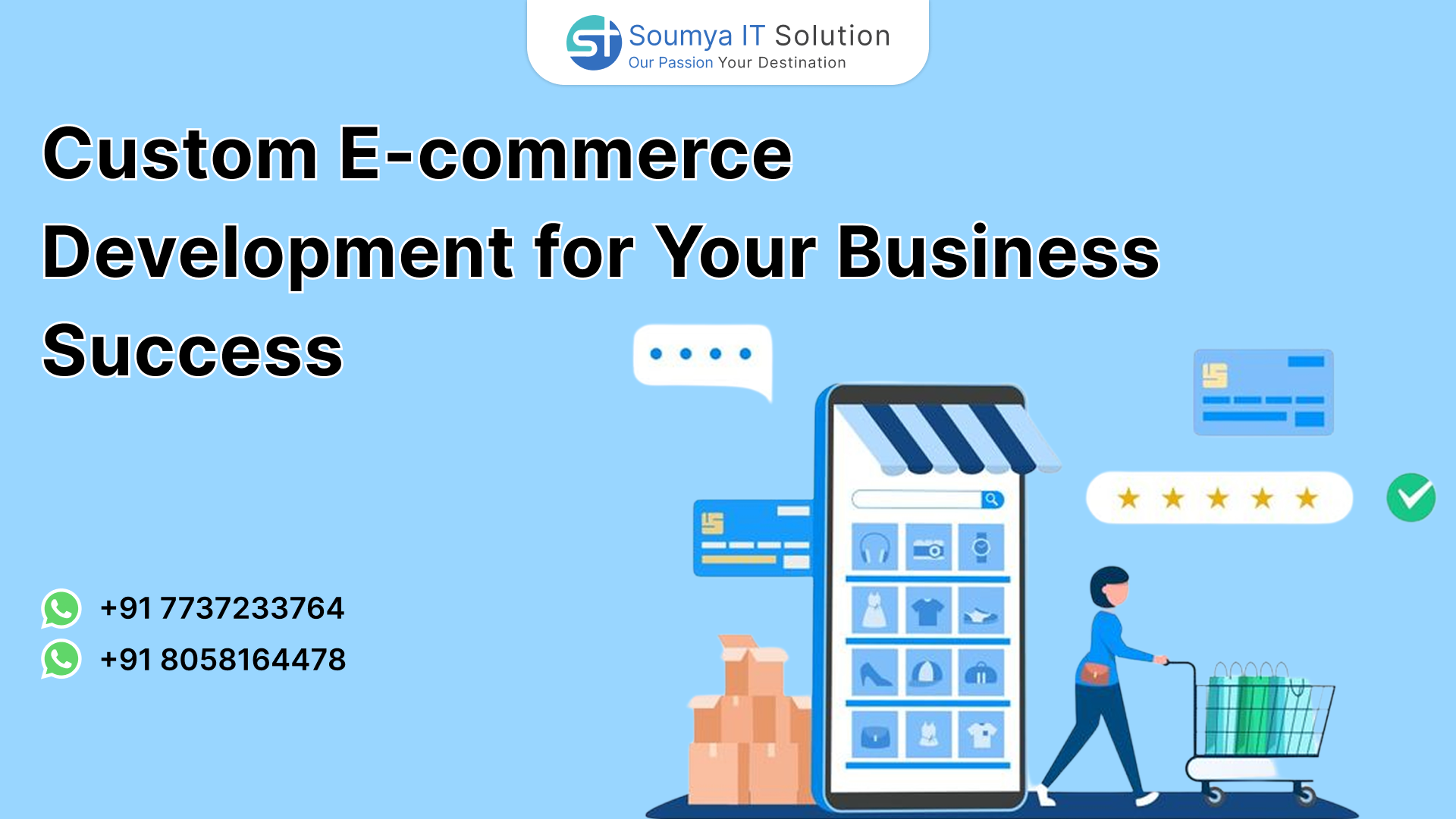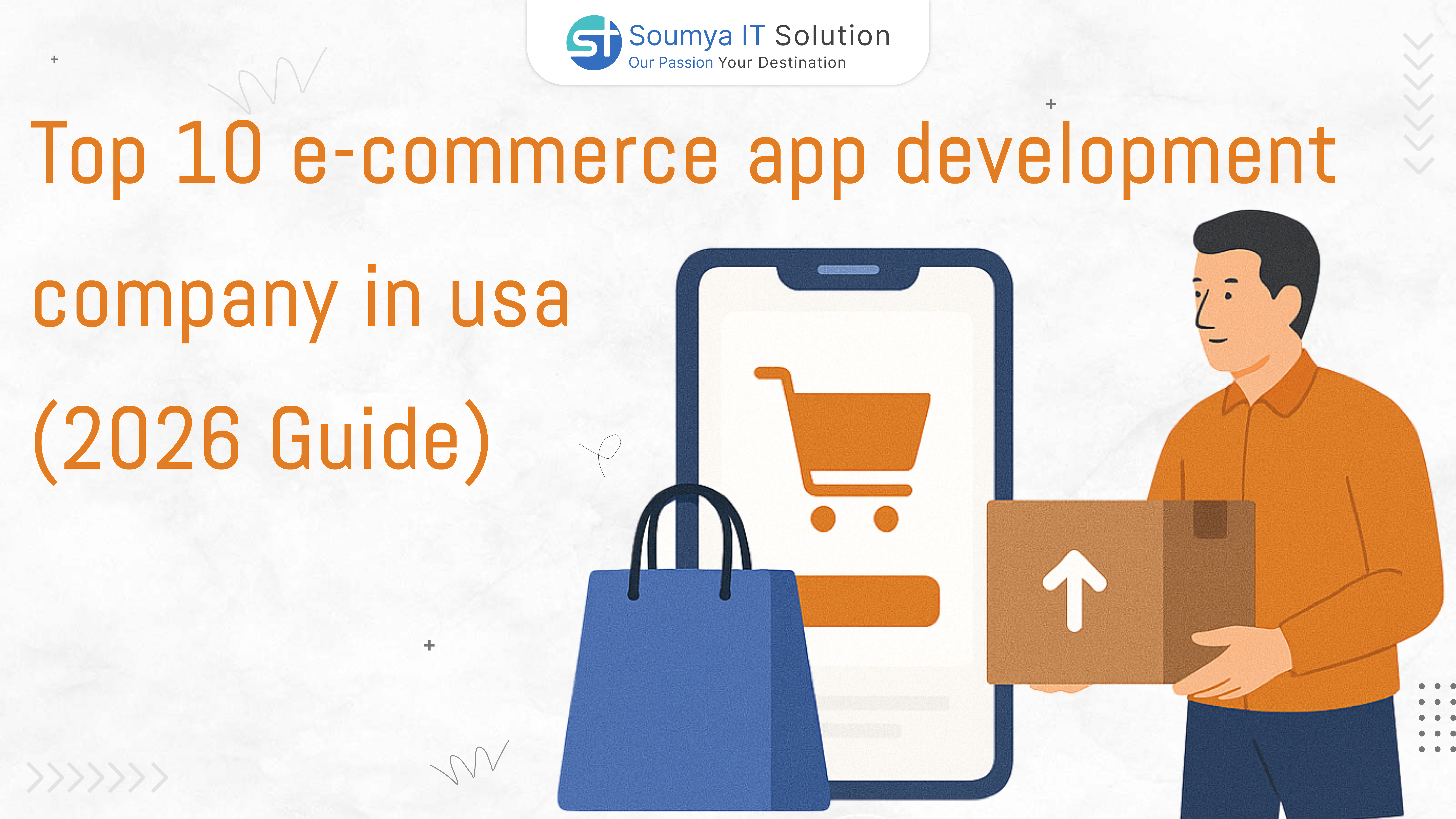
Custom E-commerce App Development: Build a Scalable Solution to Grow Your Business
Top Ecommerce Trends That Will Shape 2026 — Soumya IT Solution Updated for 2026 — AI, Data, Social Commer...
Top Ecommerce Trends That Will Shape 2026 — Soumya IT Solution
Updated for 2026 — AI, Data, Social Commerce, Video Commerce & Future Tech
Some ecommerce trends fade quickly, while others redefine the entire industry.
After rapid innovation across 2024 and 2025, businesses are now evaluating which technologies will truly matter in 2026.
This expert guide from Soumya IT Solution highlights the most impactful ecommerce trends that will shape customer expectations, business growth, and digital transformation in the coming year.
What You’ll Learn
-
AI is boosting ecommerce efficiency
-
Data management & harmonisation are top priorities
-
Conversational commerce is becoming more human
-
Headless commerce is accelerating digital agility
-
Resale commerce is booming
-
Social commerce is evolving fast
-
Video commerce is dominating
-
Loyalty programs are becoming ultra-personalised
-
User-generated content is driving conversions
-
Subscription models are expanding
-
Ecommerce FAQs for 2026
1. Artificial Intelligence Is Boosting Efficiency (More Than Ever in 2026)
AI has become the backbone of modern ecommerce.
In 2026, companies using AI are experiencing major advantages in speed, personalisation, and productivity.
Soumya IT Solution helps ecommerce businesses automate:
✔ Product descriptions & categorisation
✔ SEO titles, meta tags, and content optimisation
✔ AI-powered page creation
✔ Predictive customer analytics
✔ Personalised product recommendations
2026’s biggest leap is LLM-powered dynamic ecommerce websites that adapt in real time to each shopper’s behavior.
AI is no longer a trend — it is a competitive necessity.
2. Businesses Are Prioritising Data Management & Harmonisation
Data has become the most valuable asset of every ecommerce business.
But most companies still struggle to manage it effectively.
In 2026, data harmonisation is critical because it connects data from:
✔ CRM
✔ Ecommerce platforms
✔ Order management
✔ Marketing channels
✔ Inventory systems
According to Soumya IT Solution’s analysis:
📌 71% of businesses increased their data management budget in 2026
📌 52% struggle with incomplete customer insights
📌 49% want a complete, 360° customer view
Better data = Better AI = Better decisions.
3. Conversational Commerce Is Becoming More Human
Chatbots are no longer robotic or frustrating.
Thanks to generative AI and LLMs, conversational commerce now feels natural, helpful, and personalised.
Soumya IT Solution integrates conversational AI that provides:
✔ Human-like responses
✔ Personalised shopping guidance
✔ Image-based product search
✔ Real-time recommendations
✔ 24/7 instant support
With 76% of shoppers preferring AI assistants that “feel human,” conversational commerce is becoming essential in 2026.
4. Headless Commerce Helps Businesses Move Faster in 2026
Headless architecture has shifted from an emerging trend to a mainstream standard.
Businesses using headless report:
✔ 80% faster updates
✔ 73% improved flexibility
✔ 66% better integration across systems
Customers benefit from:
✔ Faster page loads
✔ More personalised experiences
✔ Seamless experiences across mobile, web & apps
If you want a future-proof ecommerce website, headless commerce is the best solution.
5. Brands Are Going Big With Resale Commerce
The global resale market continues to explode and is expected to exceed $90 billion by 2026.
Consumers now prefer:
-
Refurbished electronics
-
Vintage fashion
-
Pre-owned luxury
-
Secondhand appliances
Brands benefit with higher margins, sustainability credibility, and better loyalty.
Soumya IT Solution helps companies build resale platforms with:
✔ Reverse logistics
✔ Real-time inventory systems
✔ Efficient return workflows
The circular economy is becoming a powerful revenue model.
6. Social Commerce Is Evolving Faster Than Ever
With nearly 5 billion active users on platforms like Instagram, TikTok, and YouTube, social commerce is becoming unstoppable.
67% of global shoppers have purchased directly through social platforms.
2026 brings major advancements:
✔ AI-powered social content creation
✔ In-app checkout on Instagram & TikTok
✔ WhatsApp catalog + payment integration
✔ Live shopping events
✔ Influencer-driven sales
Social commerce now blends entertainment, community, and shopping into a single powerful channel.
7. Video Commerce Is Dominating Ecommerce Sales
Static images are no longer enough.
In 2026, customers expect:
🎥 Product demos
🎥 360° views
🎥 Try-on videos
🎥 Live shopping shows
🎥 Post-purchase tutorial videos
89% of shoppers say videos influence their purchase decisions.
Soumya IT Solution creates video-first ecommerce platforms that boost conversions by up to 2–3x.
8. Loyalty Programs Are Becoming Hyper-Personalised
Customer retention is more important than customer acquisition.
In 2026, loyalty programs are shifting toward:
✔ Personalised rewards
✔ Early access
✔ Instant benefits
✔ Tailored offers
✔ Exclusive member-only products
Customers expect more meaningful experiences in exchange for their data.
Brands that use data-driven loyalty will win long-term trust.
9. User-Generated Content (UGC) Is Driving Massive Conversions
UGC continues to be one of the strongest trust-building assets.
Why? Because it is:
✔ Real
✔ Authentic
✔ Unfiltered
✔ Community-driven
Shoppers who interact with UGC see 102% higher conversions.
UGC examples:
📌 Real customer reviews
📌 Try-on videos
📌 Before/after photos
📌 TikTok testimonials
📌 Instagram reels
Brands can use UGC for ads, product pages, and social media to generate authentic engagement at low cost.
10. Subscription Models Are Expanding Across Every Industry
In 2026, subscription services are booming across:
-
Food & snacks
-
Fashion
-
Electronics
-
Personal care
-
Pet care
-
Learning
-
Fitness
-
Books
Subscriptions =
✔ Stable recurring revenue
✔ Customer retention
✔ Predictable sales
✔ Exclusive customer experiences
More brands are adopting subscription-based models to stabilise their revenue and build long-term relationships.
Ecommerce Trends FAQ (2026 Updated)
Q1. How do I know if a trend is right for my business?
✔ Evaluate customer needs
✔ Conduct cost–benefit analysis
✔ Study competitor behavior
✔ Focus on long-term ROI
Q2. Is ecommerce still growing in 2026?
Absolutely yes.
Global ecommerce revenue is expected to reach $8.5 trillion by 2026.
Q3. How do I start implementing AI?
Start with:
✔ Content automation
✔ SEO automation
✔ Chatbots
✔ Product recommendations
✔ Data harmonisation
Trust, transparency, and data privacy are extremely important.
Q4. How do I measure success after adopting new trends?
Key ecommerce KPIs:
-
Conversion rate
-
Average order value
-
Repeat purchase rate
-
Customer acquisition cost
-
Cart abandonment rate
-
LTV vs CAC ratio
Tracking KPIs ensures better decision-making and smarter planning.
Written by Soumya IT Solution
India’s Leading Web Development, App Development & AI Automation Company
📞 +91 77372 33764 | +91 80581 64478
🌐 https://soumyaitsolution.com







